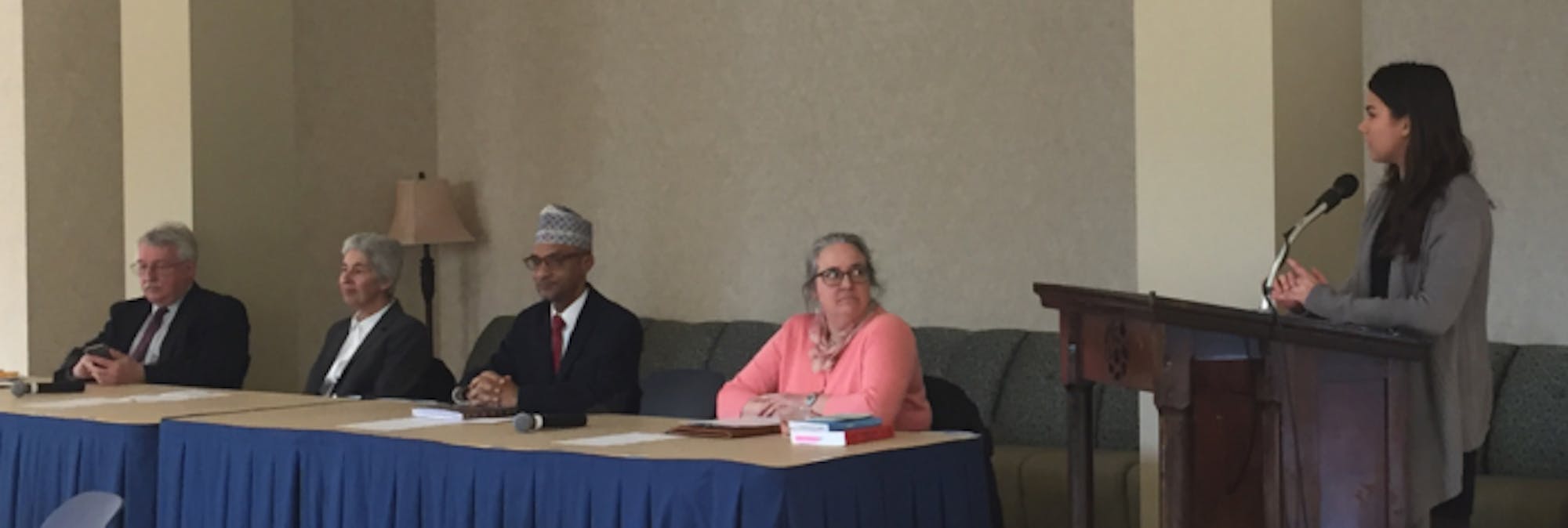Members of the South Bend community came together for a discussion about interfaith dialogue and awareness of social justice in a panel hosted by the Better Together club Tuesday in the Rice Commons of Saint Mary’s Student Center.
The panel featured four speakers, each of different religious backgrounds — Emily Sipos-Butler, assistant director of Campus Ministry at Saint Mary’s; A. Rashied Omar, faculty member at Notre Dame’s Kroc Institute for International Peace Studies; Rabbi Karen Companez of Temple Beth-El in South Bend; and Robert Stockman, a professor of religious studies and philosophy at Indiana University South Bend.
As the panelists introduced their religious traditions, Sipos-Butler, a Catholic, said her faith is the primary lens through which she views justice.
“One of the ways that you can think about justice from a Christian perspective is that justice is God,” Sipos-Butler said. “Justice flows from the fact that God is love. Love and justice are intimately tied together in the Christian tradition.”
Sipos-Butler believes there are multiple dimensions of justice, she added. Distributive justice, or the relationship of a community to its members, requires equal distribution of resources to those whose needs are unmet. Commutative justice, on the other hand, refers to equality and fair exchange between individuals.
“[Commutative justice is] fundamental fairness of different groups that needs to be upheld,” Sipos-Butler said.
She said both these types of justices make up social justice.
Omar, who is Muslim, said the Islamic view of social justice was similar to that of Christianity.
“Rather than love, we have compassion,” he said.
He said in Islam, love is viewed as a critical part of social justice, but it is compassion that is the most important.
“If justice is devoid of compassion, mercy and tenderness, it becomes the antithesis of justice,” Omar said.
The Quran proclaims justice is the closest thing to piety, Omar added. He said Muslims are encouraged to embrace all forms of justice, and that justice is intersectional — one cannot embrace one form without embracing the others.
Jewish teachings on justice preach service to the poor, Companez said. The Torah instructs Jews to care for the widows, children and strangers 36 times.
“In Judaism, we are commanded, ‘Justice, justice, shall you pursue.’ That comes straight from the book of Deuteronomy,” Companez said.
Treating all others with equity and respect is a foundational aspect of Jewish social justice, she added.
“We learn that each person is created in God’s image and there is a Jewish mystical idea that each person contains a spark of God,” Companez said. “ … If that’s the case, we should relate to every other person as if we were relating to God.”
Professor Stockman said the Bahá'í Faith, a religion of Iranian origin that teaches acceptance of all religions, approaches social justice with equality and inclusion
“Bahá'í scriptures emphasize the common source of our equal status,” Stockman said. “Where justice is concerned, the scriptures say that it is the appearance of unity among men. You cannot have unity where you have injustice.”
Stockman said the Bahá'í Faith was founded by Persian religious leader Bahá'u'lláh and introduced to the United States in 1912 by his son, `Abdu'l-Bahá, a proponent of women’s suffrage and racial equality.
“It is one thing to teach equality,” Stockman said. “And another to have women and African Americans being treated equally.”
Each panelist then shared how social justice teachings impact their day-to-day lives.
“This is what I am called to do: to love God and do justice,” Sipos-Butler said. “What does that look like? One thing that I think about is how Jesus put himself in places where he could interact with those on the margins. I should probably be following that example.”
Rashied Omar said he strives daily to synthesize his commitments to faith and social justice.
“This calling of seeking to synthesize — to build this bridge between my spirituality and this social-justice struggle — continues to inspire me daily,” Omar said.
Companez said she works for social justice by continuing to volunteer in her community.
“We are very involved in all kinds of social justice work; it encompasses so many issues,” she said. “Racial justice, economic justice, environmental justice, women’s rights and international and global issues are just a few things that capture my attention.”
Stockman said he personally separates individual daily duties and communal daily duties.
“Individually, I think my main justice issue is how to love and be kind and encourage my students. My main focus of my day-to-day efforts is how to be a good teacher,” he said. “ … Communally, the Bahá'í approach to social justice is one that has been called ‘constructive engagement.’”
The faith focuses on fostering community between peoples, Stockman added.
“In some countries that don’t have access to education, we bring them education,” he said. “‘Constructive engagement’ looks different all over the world, but the purpose is to bring people together.”













